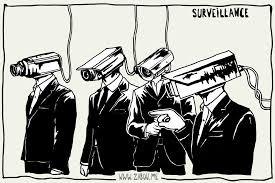David L. Atkinson's Blog, page 112
July 19, 2014
Writing - Surveillance society meets Big Brother
You know those moments when you have a feeling that something is wrong and when you bring the problem up in conversation people look at you as if you're a bit weird. Since the demonisation of Edward Snowden by the USA and UK government and his asylum in Russia I have increasingly felt that ordinary people are missing the point. So it was with a degree of smugness that I read the article reproduced below from the UN Human Rights watchdog.

Too many governments are "rubber-stamping" mass surveillance programmes, the UN human rights watchdog warns.In a report, the UN body said more needed to be done to ensure that surveillance was balanced against its harm to personal privacy.
It added that mass retention of data to aid surveillance was "neither necessary nor proportionate".
The report comes as the UK passes an emergency law to make ISPs and mobile companies store user data.
The document was written by the office of Navi Pillay, the UN High Commissioner for Human Rights, who said it revealed a "disturbing" lack of transparency about the reasons governments approve or start large-scale monitoring of what people do online.
Mass surveillance, said Ms Pillay, was becoming a "dangerous habit rather than an exceptional measure" for governments.
Assisted dying
[image error]
This topic worries me greatly. Living increasingly in an Orwellian 'big brother' society controlled by a filthy rich minority we shouldn't be giving them tools to bring about control over life and death. I was gratified to hear Dame Tanni Grey-Thompson put forward this point in somewhat less emotive language but even so the House of Lords has allowed this bill to go forward to the next stage.I may seem to be being alarmist but consider the current state of the NHS, the elitist nature of the government and the increase in the older end of population. The government need to save money so how long will it be before assisted dying is pushed forward as an alternative option to expensive palliative care?
I am sure there are several stories in both of these articles and it wouldn't take too much of a stretch to see 'Steele' investigating and righting some wrongs in his own inimitable way.
God Bless

Too many governments are "rubber-stamping" mass surveillance programmes, the UN human rights watchdog warns.In a report, the UN body said more needed to be done to ensure that surveillance was balanced against its harm to personal privacy.
It added that mass retention of data to aid surveillance was "neither necessary nor proportionate".
The report comes as the UK passes an emergency law to make ISPs and mobile companies store user data.
The document was written by the office of Navi Pillay, the UN High Commissioner for Human Rights, who said it revealed a "disturbing" lack of transparency about the reasons governments approve or start large-scale monitoring of what people do online.
Mass surveillance, said Ms Pillay, was becoming a "dangerous habit rather than an exceptional measure" for governments.
Assisted dying
[image error]
This topic worries me greatly. Living increasingly in an Orwellian 'big brother' society controlled by a filthy rich minority we shouldn't be giving them tools to bring about control over life and death. I was gratified to hear Dame Tanni Grey-Thompson put forward this point in somewhat less emotive language but even so the House of Lords has allowed this bill to go forward to the next stage.I may seem to be being alarmist but consider the current state of the NHS, the elitist nature of the government and the increase in the older end of population. The government need to save money so how long will it be before assisted dying is pushed forward as an alternative option to expensive palliative care?
I am sure there are several stories in both of these articles and it wouldn't take too much of a stretch to see 'Steele' investigating and righting some wrongs in his own inimitable way.
God Bless
Published on July 19, 2014 11:02
July 18, 2014
Writing - A writing and reading journey
Corresponding Writers blog by Bert Carson has featured a blog I produced on the subject of letter writing. The link is below:-
http://correspondingwriters.blogspot.com/2014/07/guest-blogger-david-l-atkinson-writer.html
 Bert Carson
Bert Carson
Read the blog and you will see some of the benefits of taking up a fountain pen.
As I'm on the subject of what may be considered an old-fashioned subject I think it appropriate to consider some aspects of life in the UK a few hundred years ago. There was one word that caught my attention - scavengers.
Meaning -
1. a person who collects things discarded by others
2. (Zoology) any animal that feeds on decaying organic matter, esp on refuse
3. (Chemistry) a substance added to a chemical reaction or mixture to counteract the effect of impurities
4. a person employed to clean the streetsIn Tudor England when your cesspit was full you would send for the scavengers who would remove the effluent and sell it on for use as fertiliser.
[image error]
Not only did society in those times have problems to overcome in regards of getting rid of waste but they also had an enforced social conscience. In Germany and other European countries, when there is a fall of snow, householders are responsible for cleaning up your part of the road on which you live. In Tudor England you were required to clean your part of the street twice a week.
I remember travelling in the Netherlands a number of years ago and seeing the shop owners cleaning the outside of their premises before the business day began. I can't help feeling that we have lost something by ceding this relatively minor responsibility to council workers who have no feeling for the areas they are cleaning up.
Finally, the source of many baby boomers' first eperiences in independent reading.
Comic books

Comic books or as Michael Corleone called them in the Godfather, funny papers were so very popular in my generation. Quite often children, boys in particular, began with the above or the Beano and then graduated to Hotspur, Victor or the Eagle which had fewer pictures and more reading.
[image error]
I have little experience of what children do these days once they are deemed too old to be read to at home. I feel that they are looking at screens, playing games but not reading as much as we did fifty plus years ago. Perhaps I'm wrong but one thing for certain the necessity to be able to read will not go away. While that is the case we should keep writing.
God Bless
http://correspondingwriters.blogspot.com/2014/07/guest-blogger-david-l-atkinson-writer.html
 Bert Carson
Bert Carson
Read the blog and you will see some of the benefits of taking up a fountain pen.
As I'm on the subject of what may be considered an old-fashioned subject I think it appropriate to consider some aspects of life in the UK a few hundred years ago. There was one word that caught my attention - scavengers.
Meaning -
1. a person who collects things discarded by others
2. (Zoology) any animal that feeds on decaying organic matter, esp on refuse
3. (Chemistry) a substance added to a chemical reaction or mixture to counteract the effect of impurities
4. a person employed to clean the streetsIn Tudor England when your cesspit was full you would send for the scavengers who would remove the effluent and sell it on for use as fertiliser.
[image error]
Not only did society in those times have problems to overcome in regards of getting rid of waste but they also had an enforced social conscience. In Germany and other European countries, when there is a fall of snow, householders are responsible for cleaning up your part of the road on which you live. In Tudor England you were required to clean your part of the street twice a week.
I remember travelling in the Netherlands a number of years ago and seeing the shop owners cleaning the outside of their premises before the business day began. I can't help feeling that we have lost something by ceding this relatively minor responsibility to council workers who have no feeling for the areas they are cleaning up.
Finally, the source of many baby boomers' first eperiences in independent reading.
Comic books

Comic books or as Michael Corleone called them in the Godfather, funny papers were so very popular in my generation. Quite often children, boys in particular, began with the above or the Beano and then graduated to Hotspur, Victor or the Eagle which had fewer pictures and more reading.
[image error]
I have little experience of what children do these days once they are deemed too old to be read to at home. I feel that they are looking at screens, playing games but not reading as much as we did fifty plus years ago. Perhaps I'm wrong but one thing for certain the necessity to be able to read will not go away. While that is the case we should keep writing.
God Bless
Published on July 18, 2014 11:22
July 17, 2014
Writing - Surviving the plethora of changes.
I have often made reference to the changes that are taking place in this modern world in this blog from the point of view of lamenting what has gone and accepting what we have, but what of the future?
[image error]
One of the possible futures has been talked about in the news today. On the subject of spying, which has arisen because of the expulsion from Germany of an American accused of spying, there are some espionage masters suggesting that they are considering going back to typewriters and hard copy to reduce the possibility of surveillance.
[image error]
I remember typing a 25 000 word thesis for my teaching degree on a Remington Noiseless and, as a strictly two fingered typist, I wouldn't recommend going back to that form of communication. Besides which paper copies can be photographed or scanned and sent anywhere instantaneously by the internet.

Then there is the shopping revolution. Is it possible that we will see a world without shops? If you are unsure take a walk down the high street of any small of medium sized town. There are charity shops, card shops, pawn shops (yes they are making a come back), and short term loan emporia. What is missing are the high street stores such as M & S, Boots, W H Smith and so on. Some would say that they've gone to shopping centres (malls) but even there they are reducing in size. The fact that Amazon is annoying in its avoidance of tax they seem to be able to deliver an amazing range of goods cheaper and on time.

There was a history of manufacturing in the UK that pertained through to the unholy reign of Margaret Thatcher, Tony Blair and the unions. The latter became greedy and forced their wages up to the point where what we manufactured, clothes, cars, electricals; were too expensive and our markets disappeared across to the far east. That left a section of society that would normally have gone into apprenticeships with no manual jobs. Enter the call centres, initially servicing banks, but now almost every company has a call centre. The work is unskilled, shallow, unrewarding and with little long term job security. Our prime minister calls the UK a major financial player in the world but his assurances are hollow. Another banking crash or the like would once again see the country reeling. Germany still has a strong manufacturing culture and has the strongest economy in the western world.
Plenary
(I hate the term but people seem to accept it nowadays along with phrases like 'let me unpack that for you'! )
The short answer is that I can foresee a time when there will be no shops and no factories and we will become increasingly isolated in the physical sense from other humans. Oh, we will have computers, the internet and such tools as Skype but the human animal requires social interaction via physical presence.If you want to be truly extreme the long term for the human race is bleak. Our muscles will waste, sexual vigour will diminish and the streets and spaces outside our homes will become no go areas! In the words of the Scotsman in the TV show Dad's Army speaking to his platoon commander,
"We're doomed Captain Mannering - doomed!"

God Bless
[image error]
One of the possible futures has been talked about in the news today. On the subject of spying, which has arisen because of the expulsion from Germany of an American accused of spying, there are some espionage masters suggesting that they are considering going back to typewriters and hard copy to reduce the possibility of surveillance.
[image error]
I remember typing a 25 000 word thesis for my teaching degree on a Remington Noiseless and, as a strictly two fingered typist, I wouldn't recommend going back to that form of communication. Besides which paper copies can be photographed or scanned and sent anywhere instantaneously by the internet.

Then there is the shopping revolution. Is it possible that we will see a world without shops? If you are unsure take a walk down the high street of any small of medium sized town. There are charity shops, card shops, pawn shops (yes they are making a come back), and short term loan emporia. What is missing are the high street stores such as M & S, Boots, W H Smith and so on. Some would say that they've gone to shopping centres (malls) but even there they are reducing in size. The fact that Amazon is annoying in its avoidance of tax they seem to be able to deliver an amazing range of goods cheaper and on time.

There was a history of manufacturing in the UK that pertained through to the unholy reign of Margaret Thatcher, Tony Blair and the unions. The latter became greedy and forced their wages up to the point where what we manufactured, clothes, cars, electricals; were too expensive and our markets disappeared across to the far east. That left a section of society that would normally have gone into apprenticeships with no manual jobs. Enter the call centres, initially servicing banks, but now almost every company has a call centre. The work is unskilled, shallow, unrewarding and with little long term job security. Our prime minister calls the UK a major financial player in the world but his assurances are hollow. Another banking crash or the like would once again see the country reeling. Germany still has a strong manufacturing culture and has the strongest economy in the western world.
Plenary
(I hate the term but people seem to accept it nowadays along with phrases like 'let me unpack that for you'! )
The short answer is that I can foresee a time when there will be no shops and no factories and we will become increasingly isolated in the physical sense from other humans. Oh, we will have computers, the internet and such tools as Skype but the human animal requires social interaction via physical presence.If you want to be truly extreme the long term for the human race is bleak. Our muscles will waste, sexual vigour will diminish and the streets and spaces outside our homes will become no go areas! In the words of the Scotsman in the TV show Dad's Army speaking to his platoon commander,
"We're doomed Captain Mannering - doomed!"

God Bless
Published on July 17, 2014 13:50
July 16, 2014
Poetry Thursday 119 - The Heart
We take it for granted, our heart that began beating before we were born and will continue until the day we die. My daughter visits a midwife to hear her babies heartbeat at only about 16 weeks of the 40 of a standard pregnancy. The health organisations shout at us about the abuse we put our hearts through, we all know the issues. Here is a summation of that amazing piece of engineering that has nothing to do with 'man-made'!!

The Heart
Taken very much for grantedthe mystical beating heart,throbbing, pulsating powerfullykeeping life and death apart.
Day and night working unsungfrom consciousness’s flow chartfour chambers – rooms of existencetravailed before real life did start.
Amazingly resilient to the abusethat tries to pierce as a dartit continues to pound life-giving useobesity, smoking, drinking to thwart.
As strong as it is there is a delicacyGod may have chosen to impartbefore birth and conscious malignityperhaps causing premature depart.
It holds all life in its chambershopefully healthy from the start.That pulsing, throbbing lovely organthe almost tireless human heart.© David L Atkinson July 2014
God Bless

The Heart
Taken very much for grantedthe mystical beating heart,throbbing, pulsating powerfullykeeping life and death apart.
Day and night working unsungfrom consciousness’s flow chartfour chambers – rooms of existencetravailed before real life did start.
Amazingly resilient to the abusethat tries to pierce as a dartit continues to pound life-giving useobesity, smoking, drinking to thwart.
As strong as it is there is a delicacyGod may have chosen to impartbefore birth and conscious malignityperhaps causing premature depart.
It holds all life in its chambershopefully healthy from the start.That pulsing, throbbing lovely organthe almost tireless human heart.© David L Atkinson July 2014
God Bless
Published on July 16, 2014 05:55
July 15, 2014
Writing - Corresponding on paper
Over the recent months I have been communicating by long hand and snail mail with fellow writer Bert Carson. He is very keen on writing using fountain pens and offered to reproduce a blog of mine on his blog 'Corresponding Writers'
[image error]
It is interesting thinking back over the years about my writing experiences and at times it has been somewhat painful. As a child attending infant school (5 - 7 years) I was under the tutelage of a bit of a harridan Mrs Dobson. It was my misfortune to repeatedly pick up the pencil presented to me in my left hand, which in 1955 was almost a cardinal sin. I was repeatedly whacked over the knuckles until I picked up the pen in the 'correct' hand. So it was a wonder I ever wrote with a pen.

Moving on - my father was quite strict about the quality of my written work and if he spotted me making a mistake and crossing out he would make me start again. He wasn't being unkind but wanting me to do my best so there was no punishment attached to my making a mistake.
So the early years weren't easy for me writing on paper and the advent of computers was a godsend, but the intervening years had various writing experiences that were memorable.
At the age of 14 I began dating a girl which led to writing love letters and fifty years on I still remember the thrill of receiving a handwritten reply.
When I left home to go to college four years later I was partially supported by my parents and as this was before the time that they had a house phone I used to write a letter every week and woe betide if it was late in arriving! This went on for the full three years and for some time afterwards, because it was 1979, and the birth of the first grandson, when mum and dad finally agreed to have a phone put into the house. Then the letters stopped.

At that point the world began to change and change rapidly. When I was teaching science in a middle school the government gave schools a computer. There was a total lack of knowledge and understanding about the machines so schools gave the machines into the care of the science or maths teacher. It was my good fortune that in our school it went to the science department - me!
Really since then I have rarely written a letter in anger and yet I must have missed the experience. It has been a positive action becoming involved in corresponding writers and writing and receiving a letter through the post stamped Huntsville, Alabama. As I understand it there are numerous other people involved in this form of communication. There is something more tangible about a communication that has been physically worked on to paper, each stroke by a human hand holding a fountain pen. It is a real connection and I would advise all who had the time to try it for a while, it is every bit as addictive as writing fiction but less one sided!
God Bless
[image error]
It is interesting thinking back over the years about my writing experiences and at times it has been somewhat painful. As a child attending infant school (5 - 7 years) I was under the tutelage of a bit of a harridan Mrs Dobson. It was my misfortune to repeatedly pick up the pencil presented to me in my left hand, which in 1955 was almost a cardinal sin. I was repeatedly whacked over the knuckles until I picked up the pen in the 'correct' hand. So it was a wonder I ever wrote with a pen.

Moving on - my father was quite strict about the quality of my written work and if he spotted me making a mistake and crossing out he would make me start again. He wasn't being unkind but wanting me to do my best so there was no punishment attached to my making a mistake.
So the early years weren't easy for me writing on paper and the advent of computers was a godsend, but the intervening years had various writing experiences that were memorable.
At the age of 14 I began dating a girl which led to writing love letters and fifty years on I still remember the thrill of receiving a handwritten reply.
When I left home to go to college four years later I was partially supported by my parents and as this was before the time that they had a house phone I used to write a letter every week and woe betide if it was late in arriving! This went on for the full three years and for some time afterwards, because it was 1979, and the birth of the first grandson, when mum and dad finally agreed to have a phone put into the house. Then the letters stopped.

At that point the world began to change and change rapidly. When I was teaching science in a middle school the government gave schools a computer. There was a total lack of knowledge and understanding about the machines so schools gave the machines into the care of the science or maths teacher. It was my good fortune that in our school it went to the science department - me!
Really since then I have rarely written a letter in anger and yet I must have missed the experience. It has been a positive action becoming involved in corresponding writers and writing and receiving a letter through the post stamped Huntsville, Alabama. As I understand it there are numerous other people involved in this form of communication. There is something more tangible about a communication that has been physically worked on to paper, each stroke by a human hand holding a fountain pen. It is a real connection and I would advise all who had the time to try it for a while, it is every bit as addictive as writing fiction but less one sided!
God Bless
Published on July 15, 2014 11:04
July 14, 2014
Tuesday Recipe - Fusilli and sausage bake
This is a recipe adapted from a recipe with the title 30-minute Ravioli and Sausage Skillet. There were several reasons for the changes That I've made - I don't own an oven proof skillet and I didn't have any ravioli in the house!

For ravioli read fusilli and I baked the resultant dish in a casserole. The overall is a very tomato heavy Italian style dish. There were other changes such as the sausage which was a tomato variety instead of the recommended Italian sausage and in the absence of oregano I used fresh basil - it goes very well with tomato.
The full recipe is on the Tab above.
God Bless

For ravioli read fusilli and I baked the resultant dish in a casserole. The overall is a very tomato heavy Italian style dish. There were other changes such as the sausage which was a tomato variety instead of the recommended Italian sausage and in the absence of oregano I used fresh basil - it goes very well with tomato.
The full recipe is on the Tab above.
God Bless
Published on July 14, 2014 12:21
July 13, 2014
Writing - Points in time
When we write about a point in time to provide the reader with texture we need to add relevant detail.
This weekend there have been some very interesting pronouncements, even one or two that might lead to another Steele tale. Let me share.

It must be said that many countries round the world have female bishops but this position, for the UK, has dragged on for a while. There are still some very conservative members of the church who haven't really accepted the ordination of women even thought that decision was made 20 years ago. It looks like all that will change at General Synod in York tomorrow.
[image error]
This Friday the House of Lords will once again debate a bill on assisted dying. This terrifies me if I'm honest and could well lead to a Steele novel. Archbishop Desmond Tutu and ex- Archbishop of Canterbury Carey have come out in favour on the grounds of individual cases they have been influenced by and also the caring nature of Christians. However, if you consider the nature of governments and the need to save money by cutting back on benefits and publicly run services such as the NHS, then you would also worry. The coalition government in the UK along with the labour party are establishment groups whose primary function is to make money in the private sector. In the last four years they have passed various laws that have bolstered their capitalistic position. So project forward 25 years and imagine the temptation to use a law allowing assisted dying to cut the costs of taking care of an ever ageing population!The only limits to the use of such a law is your imagination.One possible scenario is described in Claude Nougat's story 'Forever Young' which is well worth a read.Just to add fuel to the fire, in countries and states where assisted dying is permitted a third of those people going for it assert that they would rather die than be a burden. My attitude is if that is the case the health services are not doing their job properly.

There is the case of reports into sex abuse by leading political figures from the 1970's that has been covered up. There are allegations of files being destroyed and lost coupled with denial and rubbishing the claims. The government in response has called for an inquiry chaired by the sister of one of the ministers who may have been involved at some level, either in the cover up or the crimes themselves! Going back to the assisted dying - would you believe anything they told you?
[image error]
Fairly recently the European Court has removed the rights of governments to collect and hold information on possible terrorists. UK government is rushing new legislation through parliament to restore those rights. They are not worried whether or not the people who they are collecting information on are terrorists they just want the right to invade people's privacy.Going back to the assisted dying - would you believe anything they told you?
I appreciate that there is a lot of political stuff in this blog pertaining to the UK but as most governments are capitalistic in nature the views are not exclusive to the UK.
God Bless
This weekend there have been some very interesting pronouncements, even one or two that might lead to another Steele tale. Let me share.

It must be said that many countries round the world have female bishops but this position, for the UK, has dragged on for a while. There are still some very conservative members of the church who haven't really accepted the ordination of women even thought that decision was made 20 years ago. It looks like all that will change at General Synod in York tomorrow.
[image error]
This Friday the House of Lords will once again debate a bill on assisted dying. This terrifies me if I'm honest and could well lead to a Steele novel. Archbishop Desmond Tutu and ex- Archbishop of Canterbury Carey have come out in favour on the grounds of individual cases they have been influenced by and also the caring nature of Christians. However, if you consider the nature of governments and the need to save money by cutting back on benefits and publicly run services such as the NHS, then you would also worry. The coalition government in the UK along with the labour party are establishment groups whose primary function is to make money in the private sector. In the last four years they have passed various laws that have bolstered their capitalistic position. So project forward 25 years and imagine the temptation to use a law allowing assisted dying to cut the costs of taking care of an ever ageing population!The only limits to the use of such a law is your imagination.One possible scenario is described in Claude Nougat's story 'Forever Young' which is well worth a read.Just to add fuel to the fire, in countries and states where assisted dying is permitted a third of those people going for it assert that they would rather die than be a burden. My attitude is if that is the case the health services are not doing their job properly.

There is the case of reports into sex abuse by leading political figures from the 1970's that has been covered up. There are allegations of files being destroyed and lost coupled with denial and rubbishing the claims. The government in response has called for an inquiry chaired by the sister of one of the ministers who may have been involved at some level, either in the cover up or the crimes themselves! Going back to the assisted dying - would you believe anything they told you?
[image error]
Fairly recently the European Court has removed the rights of governments to collect and hold information on possible terrorists. UK government is rushing new legislation through parliament to restore those rights. They are not worried whether or not the people who they are collecting information on are terrorists they just want the right to invade people's privacy.Going back to the assisted dying - would you believe anything they told you?
I appreciate that there is a lot of political stuff in this blog pertaining to the UK but as most governments are capitalistic in nature the views are not exclusive to the UK.
God Bless
Published on July 13, 2014 11:56
July 12, 2014
Writing - 10 things we didn't know last week.
There is some really useful stuff this week!
1. The "perfect Aryan child" in Nazi propaganda posters was Jewish.
-------------------------------------
[image error]
2. The best way to prevent your headphones from tangling in your bag is to join the ends together.
I knew that!
-------------------------------------
[image error]
3. Chris Packham writes a letter every year to the makers of I'm a Celebrity... Get Me Out of Here! to complain about the show's treatment of animals.
Really!!!
--------------------------------------

4. Yorkshire and Humberside are as red-headed as Ireland.
-----------------------------------
[image error]
5. Eating an apple a day can boost sexual pleasure in healthy women.
-------------------------------------
6. The Yo mobile app is used to alert Israelis about rocket attacks.
------------------------------------
7. Historically, the perfect age to be a player in the World Cup is 27.5 - it's also the mean age of the 32 teams that played in the group matches at Brazil 2014.
-------------------------------------
8. Smell receptors are found in the heart, liver and gut, and aid the healing process.
------------------------------------
[image error]
9. Guantanamo detainees smuggle food into the recreation yard to feed Princess, the camp's cat.
--------------------------------------
[image error]
10. One in five US high school seniors has smoked hookah, and most of them are under the impression it is healthy.
I have smoked one of these in Cairo. There was a bar in a hotel that served hookahs with a variety of flavours of tobacco. I tried apple flavour.
------------------------------------
God Bless
1. The "perfect Aryan child" in Nazi propaganda posters was Jewish.
-------------------------------------
[image error]
2. The best way to prevent your headphones from tangling in your bag is to join the ends together.
I knew that!
-------------------------------------
[image error]
3. Chris Packham writes a letter every year to the makers of I'm a Celebrity... Get Me Out of Here! to complain about the show's treatment of animals.
Really!!!
--------------------------------------

4. Yorkshire and Humberside are as red-headed as Ireland.
-----------------------------------
[image error]
5. Eating an apple a day can boost sexual pleasure in healthy women.
-------------------------------------
6. The Yo mobile app is used to alert Israelis about rocket attacks.
------------------------------------
7. Historically, the perfect age to be a player in the World Cup is 27.5 - it's also the mean age of the 32 teams that played in the group matches at Brazil 2014.
-------------------------------------
8. Smell receptors are found in the heart, liver and gut, and aid the healing process.
------------------------------------
[image error]
9. Guantanamo detainees smuggle food into the recreation yard to feed Princess, the camp's cat.
--------------------------------------
[image error]
10. One in five US high school seniors has smoked hookah, and most of them are under the impression it is healthy.
I have smoked one of these in Cairo. There was a bar in a hotel that served hookahs with a variety of flavours of tobacco. I tried apple flavour.
------------------------------------
God Bless
Published on July 12, 2014 11:55
July 11, 2014
Writing - So popular characters enter the language
I was interested to see that J K Rowling accused some of the statements made by politicians in favour of Scottish devolution as Death Eaterish. What a hit it would be if you created a character and it became commonly used in your home language!
[image error]
For the uninitiated,
The Death Eaters are a group of wizards described as "pure-blood" supremacists led by the evil Lord Voldemort, Potter's arch-enemy. They are contemptuous of "half-bloods" and human "muggles".
The amusing aspect being that one of these Scottish devolutionists replied to Ms Rowling that the use of the 'D-word' was as low as you could get in the Potter fandom. I believe that responding to J K's comment is adding voracity to her case.
The corollary to all this is that perhaps in the future someone will use the adjective 'Steelian' to describe an acceptable level of justice, or retribution taken by a wronged victim of crime. For a full explanation please buy ' Castled ' at £2.44 for Kindle or £5.99 in paperback.

God Bless
[image error]
For the uninitiated,
The Death Eaters are a group of wizards described as "pure-blood" supremacists led by the evil Lord Voldemort, Potter's arch-enemy. They are contemptuous of "half-bloods" and human "muggles".
The amusing aspect being that one of these Scottish devolutionists replied to Ms Rowling that the use of the 'D-word' was as low as you could get in the Potter fandom. I believe that responding to J K's comment is adding voracity to her case.
The corollary to all this is that perhaps in the future someone will use the adjective 'Steelian' to describe an acceptable level of justice, or retribution taken by a wronged victim of crime. For a full explanation please buy ' Castled ' at £2.44 for Kindle or £5.99 in paperback.

God Bless
Published on July 11, 2014 11:46
July 10, 2014
Writing - Venture Galleries and devaluing books
[image error]Caleb Pirtle & Stephen Woodfin
The two gentleman pictured are the godfathers of the Venture Galleries website and Caleb (on the left) has nominated me for the Very Inspiring Blogger Award for which I am extremely grateful. It entails submitting things about myself (included below) and nominating fellow writing bloggers. As I was preparing this I thought I would share some of what will be shown on the Venture Galleries website in the next few days.
Seven Facts about me:
· I consider writing as much of a hobby as anything else. I had wanted to write over a number of years but it wasn’t until I was working part-time that I felt there was the time available to do myself justice.
· I greatly enjoy cooking although I’m not claiming to be a good cook. These days cook for myself only but started creating regularly when my mother, now deceased, could no longer manage for herself. I have no particular favourite recipes but do like to eat Italian.
· It is counter-productive to be negative in life so even though there are down sides to writing I try to get over them as quickly as possible. I’m not keen on editing but that has been me in all aspects of life. Once I’ve completed a job I have never liked going back over it again. However, if I’m to be negative about anything it would be about selling and marketing. I have often been heard to say that I couldn’t sell fridges in the desert so selling books – I’ve no chance.
· Apart from writing I do have other interests that consume my time. I have relatively recently taken to writing letters in long hand to Bert Carson, I am fully involved in church activities and particularly as part of the team that tend the graveyard which is large and requires a fair amount of attention.
· Music is an important part of my life and had been for the last 30 years. It should really have been for longer but I didn’t discover my abilities until a friend at church and another at work pointed out that I had some talent. As a result of their kind words I have sung at an amateur level for an operatic society, a Gilbert & Sullivan society, the church choir and the Huddersfield Choral Society. The latter has had me performing in places in the UK such as Royal Albert Hall and on TV but also as far afield as Osaka, Japan and various venues in Europe.
· It would be remiss of me not to mention that I’ve been a sports fan all my life. Following in my father’s footsteps I played football and cricket then when in my late 20s took up running. Although never having completed a full marathon I’ve completed a number of runs half of that distance until injury interrupted my running and now I’m the finest armchair sportsman in my house.
· Finally, although I live alone, I have three children from two marriages all of whom I’m immensely proud. The youngest, my daughter, married earlier this year and announced recently that she is expecting a baby herself so roll on the New Year.
This may well turn out to be a first attempt.
Stephen Woodfin
I read Stephen's blog this morning. He produces many thought provoking pieces and this was one on how books are devalued!
The premise being that rubbishing the author because of the price or mode of publishing devalues books in general when in fact Stephen argues that it is having your work sitting on shelves unread which is at fault and I don't think you can disagree with that. He states that we need to make positive steps to sell our works.
Now this links directly back to the Award I wrote about at the beginning because it is about getting yourself known but there is a psychological problem for many human beings. As a member of the 'baby boomer' generation I was brought up not to push myself forward before other people and pushing my books feels 'wrong'!
I don't think that I'm incorrect in saying that the majority of ordinary folk would fit into that more reserved pattern of behaviour.
This situation makes it difficult to sell and I have often said of myself that I couldn't sell fridges in the desert but here I have an opportunity.
So what do you need to do?
Well you could beg!!!!
I do use social media - results are poor down to pathetic.
Personal contact - this has been the most successful but even that is relative.
On the pricing of books I feel that is quite a tricky matter. I recently bought J K Rowling's (writing under the name of Robert Galbraith) Silkworm costing £6.99 for Kindle - it is almost £14 for hardback copy. Now I could price my books at that level but I don't believe that would help sales.
The price of a book is made up of many factors - printing costs, editing and design costs, advertising, the agents cut and the publisher's cut - this is not an exhaustive list. Add to that the level of consideration you have to give to the current market price of books and you have some ideas to the scale of the problem. For writers who publish independently the expenses are slightly different and not as great, and added to that is the fact that we don't have a 'name'.
I have a 'b' in my bonnet about the accepted publishing route which is not unreasonable an opinion to hold. Publisher's need to make money and that simple fact colours the way they look at totally new writers. An untried author is a risk whereas a famous footballer, jailbird MP or pop singer have 'a name' and part of the marketing war is won. It may only be one battle but it is significant.
So how do we establish a name?
Answer - I have no idea other than to suggest published reviews and word of mouth are probably as helpful as anything.
If you come up with anything please let me know.
God Bless
Published on July 10, 2014 14:03



